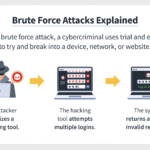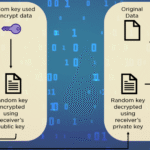The quest for the elusive private key is a subtextually rich topic fraught with misunderstandings and misconceptions, particularly when contextualized within the realm of cryptocurrency wallets. The thrust of this investigation is to dissect the veracity of claims that one can derive a private key solely from a wallet address. Faced with the dichotomy of myth versus reality, individuals interested in cryptocurrency security must approach this topic with a discerning eye.
To adequately engage with this subject, it is imperative to first delineate the fundamental architectures of cryptocurrency wallets, particularly focusing on the roles that public and private keys play. The architecture of most cryptocurrencies revolves around cryptographic principles, whereby the public key serves as a transparent identifier within a blockchain network. In contrast, the private key acts as a guarded passport that authorizes access to the wallet, thereby enabling the execution of transactions ranging from sending to receiving assets.
The genesis of the inquiry into deriving private keys from wallet addresses springs from a ubiquitous misconception that these two concepts are symbiotically intertwined in a manner that allows retroactive access to private keys. This claim, however, can be primarily situated within the domain of myth. In practical terms, wallet addresses are ostensibly derived from public keys through a series of cryptographic transformations, specifically hashing functions. Hence, an essential characteristic of cryptographic design is that it is unidirectional—while it is possible to generate a wallet address from a public key, the inverse process is propped by significant computational impracticality.
At the crux of this matter lies the hashing algorithms utilized in the generation process. For instance, Bitcoin employs the SHA-256 and RIPEMD-160 hashing functions as part of its address creation workflow. These algorithms are engineered to produce what is termed a “one-way function,” meaning that reversing the output to retrieve the input is, for all intents and purposes, infeasible under current computational paradigms. Consequently, to assert that a private key can be fetched using only a wallet address transcends the purview of plausible cryptographic capability.
Furthermore, the concept of brute force attacks often surfaces in discussions surrounding the potential to find a private key. This form of attack involves systematically searching through vast combinations of possibilities to locate a matching private key corresponding to a defined address. With the sheer magnitude of possible private keys—in most cryptocurrencies, this number spans into the quintillions—such endeavors amount to an impractical exercise in futility. Even possessing advanced computational resources would not proportionately increase the probability of success to a meaningful extent within realistic timeframes.
The recursive nature of deriving public keys from private ones serves to exacerbate the unfounded nature of the original claim. The operational protocols adhered to in the creation of a wallet address intentionally obfuscate any direct correlation with the private key. Consequently, any attempt at deducing this crucial piece of information purely from a wallet address negates established cryptographic principles and possesses no empirical substantiation.
Turning our attention to scenarios in which individuals may encounter lost or inaccessible private keys, one often hears tales of “wallet recovery” through mnemonic phrases or seed phrases. While these mnemonic devices serve as a backup mechanism for retrieving wallets, they operate independently of the address itself. The mnemonic phrase ostensibly encodes a collection of random values, allowing practitioners to reconstruct their private keys. This method illustrates the intrinsic design embedded within wallet systems but elucidates that it is a conscious user intervention—distinctly separate from the flawed ideological framework proposing the derivation of private keys from wallet addresses.
In the broader discussion surrounding wallet security, it is worth noting the importance of safeguarding private keys as they represent the entire reservoir of value encapsulated within a cryptocurrency wallet. Best practices involve using hardware wallets, ensuring robust password management, and employing multisignature protocols where feasible. These methodologies signify proactive measures, as opposed to the futile search for a solution that simply does not exist within theoretical or practical realms.
In conclusion, the notion that one can find a private key solely from a wallet address is unequivocally entrenched in myth. This premise runs counter to the robust cryptographic frameworks that underpin modern cryptocurrencies. As the blockchain ecosystem continues to evolve, discerning such truths will remain vital for anyone engaged in the management and safeguarding of digital assets. Clarity surrounding these subjects fosters a healthier discourse on security practices, encouraging users to adhere to established methodologies rather than pursue hollow claims rooted in unfounded optimism.
Consequently, it becomes imperative for individuals immersed in the realm of cryptocurrency to understand the delineation between fact and fiction. Rather than succumbing to the allure of potential shortcuts, the focus should shift towards reinforcing security strategies and fostering informed practices that ensure the sanctity of private keys, ultimately safeguarding against a plethora of threats inherent in the cryptocurrency landscape.








Leave a Comment